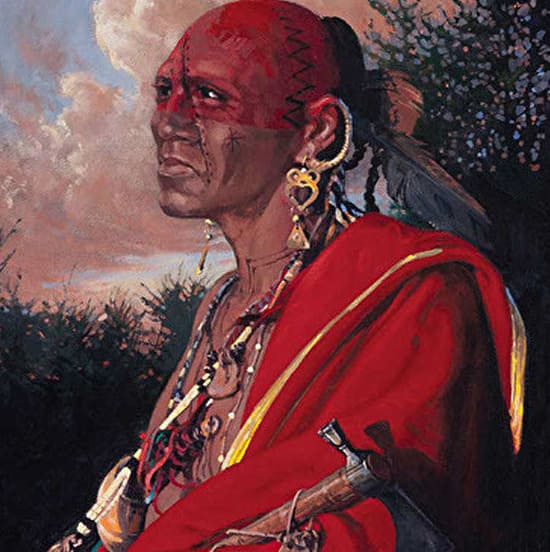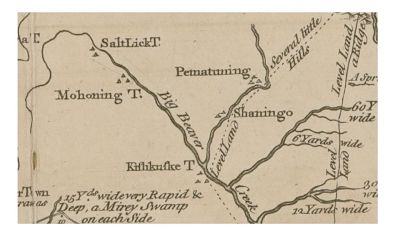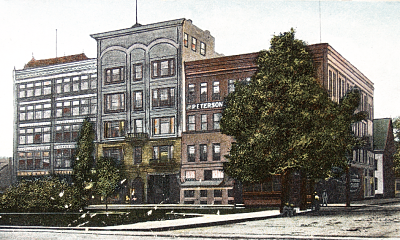“No Husband! No Meat!”(Lenni-Lenapi)
By Betty Hoover DiRisio, LCHS Volunteer (former LCHS Board Member)
What we now know as Lawrence County was formerly inhabited by a group of the Lenni-Lenape Natives, or the Delaware Nation. During the mid-1700s the Rev. John Heckewelder resided among the tribe as a Christian missionary.
Lenni Lenape (aka: Delaware Nation)
Authoring an account of their traditions, manners and customs, the Reverend provided insight into their marriage customs. Heckewelder explains:
“Marriages are proposed and concluded in different ways. The parents on both sides, having observed an attachment between two young persons, negotiate for them. This generally commences from the house where the bridegroom lives, whose mother is the negotiatrix for him, and begins her duties by taking a good leg of venison, or bear’s meat, or something else of the same kind, to the house where the bride dwells, not forgetting to mention, that her son has killed it. In return for this the mother of the bride, if she otherwise approves of the match, which she well understands by the presents to be intended, will prepare a good dish of victuals, the produce of the labour of woman, such as beans, Indian corn, or the like, and then taking it to the house where the bridegroom lives, will say, ‘This is the produce of my daughter’s field;’ and she also prepared it. If afterwards the mothers of the parties are enabled to tell the good news to each other, the young people have pronounced that which was sent them very good, the bargain is struct.”
“The men who have no parents to negotiate for them, or otherwise choose to manage the matter for themselves, have two simple ways of attaining their object. The first is by stepping up to the woman whom they wish to marry saying ‘If you are willing, I will take you as wife!’ When if she answer in the affirmative, she either goes with him immediately, or meets him at appointed time and place.”
The other was for a man to walk up to a woman and place his two fore fingers together, making them look like one, and smile at her, if she accepts they would go off together.
The duties of the two parties were defined. The husband builds the house, and canoe. The wife brings with her a kettle and cooking instruments. The husband is the provider as far as it depends upon hunting, trapping, and fishing and the wife is responsible for the fields.
“The labours of housekeeping and cooking are very trifling and if the task of the women were confined to these, they would have very little enjoyment.”
The wife therefore would plant and gather the corn, collect fuel, and if she accompanied her husband hunting or on a journey, to carry a pack containing materials for their mutual convenience. Women regarded the labors of the husband as more fatiguing and dangerous. The skins and pelts would normally be sold or bartered by the wife, who would procure in exchange for them the necessities for the family. The harvest, although gathered by the wife, was considered as belonging to the husband, and he was at liberty to dispose of it as he wished. Everything in the family had an individual owner. A horse, cow, dog, or chicken would be owned exclusively by the husband, wife or child and the master of a family would ask his wife or child for the loan of a horse or dog.
The husband was said to love his wife and would seldom quarrel with her. “He is fond of seeing her well dressed, and often makes great sacrifices to gratify her.” In 1762 Heckewelder said that there was a famine and a sick Indian woman desired some Indian corn. Her husband had heard a trader at Lower Sandusky had a little, and he set off on horseback, a hundred miles distant, and “returned with as much corn as filled the crown of his hat, for which he gave his horse in exchange, and came home on foot, bringing his saddle back with him.”
Marriage was “contracted during pleasure, and may be terminated at the will of either party.” An aged Indian explained that if a husband was cross, the wife could throw him away and take another. Further explaining that the wife “love to eat meat! no husband! no meat!”
REFERENCES
- PAINTING: Shingas, Chief of the Delaware from about 1740-1764. Painting by John Buxton, Buxtonart.com. (https://www.buxtonart.com/works/2700392/eyes-on-the-horizonh4the-delaware-shingas-h4)
- Quoted excerpts from: (1819) An Account of the History, Manners and Customs of the Indian Nations, Who Once Inhabited Pennsylvania and the Neighboring States. By the Rev. John Heckewelder, of Bethlehem. Printed and published by Abraham Small, No. 112 Chestnut Street, Philadelphia.
- To Learn More: Lenape Nation of Pennsylvania (https://www.lenape-nation.org/)
(first published on our Facebook page May 4, 2023 and titled “No Husband – No Meat”)



